|
I had some new photos taken recently for my business and received some comments when I updated my profile picture on social media.
One of my favorite comments was, “You look so much like your mother.” I take that as the highest compliment because I think my mom is kind of awesome. My mom turned 81 this year and is as active, resourceful, and curious as ever. She recently announced that she had a new job and she was so excited. Every Friday she would be working in a local used bookstore where the proceeds from the sales support the local library. My mom is a lifelong library user and fan, and the fact that she could not only do something that interests her but also be supporting the library was a perfect fit. She was given a project to organize the American History section and I know she will crush it. My mom is not afraid to walk 36 holes of golf in a day. She never comes to a dinner, party, or meeting without an article from a newspaper or magazine or just something of interest that she wants to share with us… That’s my mom. Last week I was having dinner with my mom when she announced… “I have a project for us! We are going to fill some potholes!” Now let me set this story up. I live in a rural part of the county, our little road is not county maintained - in fact, it's not maintained at all - and we have a lot of potholes. My mother had clearly noticed the abundance of potholes on our street and she thinks we should do something about it! She came across an article that described repairing potholes which inspired her to watch a YouTube video on the subject and source the necessary products. I wasn't surprised that my mom wanted to tackle this project together, because, well, that is my mother! She figured she would only need a couple of things. And #1 on that list would be that she needed my approval... And of course, my response was, “Yeah! We are going to do this!" Because well... I am my mother’s daughter! So, why am I telling you this story today? It’s almost Thanksgiving and this is traditionally the time of year where people think deeply about gratitude. I think about my mother and how much of who I am today is shaped by who she is. Not only in my DNA, but through her influence on my curiosity, my resourcefulness, my optimism, my full engagement, and my love of life. That’s my mom. Who are the people who have inspired you and helped to shape who you are? And is there something you want to say to them? Maybe like me, it’s a family member. Or perhaps a mentor, friend, or colleague. This Thanksgiving, as we think about what we are grateful for, I encourage you to share your gratitude with the people in your life. Share the love! Wishing you and your loved ones a Happy Thanksgiving.
0 Comments
What does it mean to be a brave leader?
When I ask my clients to share examples of brave leadership in their workplace, I hear things like…
Admitting we don’t have all the answers might feel especially vulnerable. Many of us have achieved success in our work in part because of what we know - our expertise. Perhaps like me, you grew up believing that the goal was to have all the answers. I remember as a young girl playfully saying to my dad "You don't know everything, Dad," to which he smiled and responded, "Almost." And yet, it’s not possible for one person to know everything. There is always something to be learned. In Dare to Lead, we explore a spectrum that ranges from being an Expert to being a Learner. A Learner may not have all the answers, but they ask the right questions. They are curious, vulnerable and show humility in order to keep learning and growing. The Expert wants to be right. The Learner wants to get it right. Letting go of our certainty can help to navigate a conflict or impasse - put the certainty aside, and get truly, genuinely curious about the other person’s position. Seek first to understand.
Letting go of our expertise and getting curious is one of the ways that brave leaders show up. The next time you feel stuck in a conversation, perhaps with both parties being certain they are right, try putting your certainty aside for a bit and get curious about the other’s position. Until next time, be brave in your willingness to not have all the answers And be kind and generous in your listening to others. I love improvisational theatre. Have you ever seen it? It is such a blast!
I think part of what is so fun about it is that everything is being made up in the moment. There is no planning, no prep - it’s all spontaneous. Like me, many of you may be thinking “How do they do that? These people are brilliant!” Agreed. Number 1 - they are incredibly courageous to get up there without a plan in front of an audience. It’s risky, exciting, and vulnerable. And #2 - good improvisers keep the action moving forward. It often feels like they are working from a script, when in fact they are not. My husband and I have a good friend who is a brilliant improviser. He is truly world-class. One of my favorite ways to watch him work is when he performs with “3 For All”. These three incredible improvisers are magical. So how do they do it? There are principles in improvisational theatre that make it work, and interestingly, many of the principles in improv can be applied to life. One universal principle in improv is saying ‘yes to all offers’ or ‘Yes, and….’ Here’s how it goes. When your partner makes an offer in the form of a statement, gesture, movement, etc., the principle guides you to say YES to the offer, and then build on it. This helps the scene continue to evolve. How that might look in improvisational theater is let’s say someone says to me, “Hey, I’ll get the fishing poles ready. Hand me that one would you?” To which I might reply, “Sure, here you go. I’m so excited. I’ve never fished for marlin before” So I’ve said yes to their offer and I’ve added something more to build on it. What doesn’t work so well is when someone blocks an offer. Imagine the offer as above, but instead of saying yes, I block it. Perhaps I had a brilliant idea in my head that I want us to go hang gliding in our scene… So I say to my scene partner, “Fishing pole? I hate fishing. I’m getting my backpack on for our hang gliding lesson.” I’ve completely blocked their offer. Now imagine if you’re that person who I just blocked, how that might feel…. Perhaps you think “I guess that wasn’t good enough.” Or “Am I even doing this scene with this person? Is it just about what she wants to do?” It doesn’t create a good connection or sense of teamwork, and it also seems strange to the audience because we see that an offer has been blocked. So how is this relevant to the workplace? The truth is… we are all improvising all the time. We may have an idea or plan of how we want our day to go, but we can’t know the details of what will actually happen. So we improvise. The principle of saying ‘Yes, and….’ can be applied to relationships, conversations, and meetings. Think about how many times you have made an offer or come up with an idea… Maybe it’s just where you want to go for dinner or an idea at work about a new project you want to start. And how many times is that met with all the reasons why that is not a good idea? “We don’t have the budget for it.” “That sounds interesting but we don’t have the time.” “No it’s just not a good idea.” Whatever the response is, the NO blocks the creativity of that moment. When we can say YES to something and build on it we generate more engagement, more investment, more enthusiasm, and more creativity. So notice, the next time you’re in a meeting, if you have the impulse to say no to something, instead of saying no, pause for a moment and see if there is something in the idea that you like and that you can build on. Even if it’s just a small part of the idea. Saying yes allows for a more collaborative conversation. It also can help others to feel a sense of being heard and respected for their ideas. And often the end result might be a combination of a number of ideas, created together by saying yes to one another. So give it a try - be brave, share a new idea, and be kind in your response to others. Let’s talk about boundaries. Ugh. Right? Why is it so hard?
It's a simple enough concept - have a sense of what is ok and not ok, and communicate that to others. Then hold firm to that choice (assuming that is what you want) no matter what the reaction. So why is it so challenging for so many of us? The need to set boundaries appears in all areas of our lives. Maybe its boundaries with someone in your family - your mother, partner, kids… Maybe you need to set more boundaries at work. Boundaries about texting after hours, when to shut off your email. Maybe even boundaries with your boss… Whatever it is, we swear to ourselves that we are going to do better with our boundaries...And yet, when push comes to shove, many of us are not so great at it. For me, I often struggle with holding a boundary when the person on the other side of it doesn’t like it. A while back I decided to take a stand with a colleague about something that was really important to me. I felt clear and I felt confident. But when I shared it - well she clearly didn't like it. Though she said it was ok with her, I could tell that she was not happy. Perhaps you have experienced something similar... So what did I do? I caved in… I just let it go. I said, "No, never mind. I can drop it. It’s not a big deal.” But the problem is that it was a big deal. To me. Ultimately I was more willing to disappoint myself than to disappoint someone else. And when I disappointed myself, I felt resentful that I was doing something that wasn’t right for me. Sound familiar? Where do you struggle with boundaries? Is it at work? At home? With friends or family? For me, it’s all of the above. When I first started intentionally setting boundaries, they were like steel walls. I had been so accustomed to abandoning myself to please others that I needed to swing too far in the other direction in order to find my balance. Today I try to be clear and kind in communicating what’s ok and what’s not ok. And I pay attention to which boundaries are essential to my well-being and which might be more flexible and permeable. What works for you? How are you able to set a boundary and hold it, even when others don’t like it? Are you a perfectionist?
Maybe this sounds familiar to you... You are about to send out a report to your boss and you think to yourself, I just need to read through it one more time (for the 50th time…). Surely I’m going to find one more typo or something I should phrase differently. Or maybe you work all weekend tweaking the font on your presentation and making tiny adjustments. You want it to be perfect. For me, perfectionism often takes the form of that voice in my head telling me “You should have said this instead of that. What you said was dumb.” or “You could have done that better.” Perfectionism is about looking outward for approval. The story we tell ourselves is that if I’m perfect, I can protect myself from criticism and judgment. And there's the fear of failing, of not being the best, of looking awkward or...imperfect. Perfectionism keeps our worlds small. When that perfectionist voice is driving me, the things that I may be willing to try, or the risks I am willing to take, become fewer and fewer as my world becomes smaller and smaller. The perfectionist voice says, “I don’t really know how to do that, that’s new to me. If I try it I might not do it perfectly so better just not try.” Do you relate to this? I have a client who had been in her previous role for about 20 years. She was really great at that job and said to me, “I’m a top performer. I like to win.” And then she moved to a new role. Though exciting and filled with possibilities, it was a difficult transition for her. She felt anxious. She had to learn new skills and processes, ones with which she was not familiar. She was accustomed to being the best at what she did and with her new role it felt to her like she was starting over. The risk she was taking to learn something new felt threatening because the perfectionist was afraid of what others might think if she was imperfect. If we let that perfectionism voice drive us, then we don’t allow ourselves the opportunity to learn, develop and grow. It takes courage to try something new. It's vulnerable - there's potentially risk, uncertainty, or emotional exposure involved. And there is also the potential for joy, aliveness, and growth. Try something new. Be imperfect. Be curious. Embrace being a learner and find out what’s possible. Everybody loves to win. It feels good to have success at something. Sometimes at work, it is a personal success or the success of the entire team. Other times, it will be another individual who has a big win. How do we celebrate those successes in the workplace? Abby Wambach knows a lot about winning. She is an Olympic gold medalist and an incredible soccer player. She writes about the lessons she learned in her book Wolfpack. One important element of success that Abby focuses on is being for each other and she emphasizes that winning is a team sport. She notes that in soccer, you will not always be the goal scorer and when you are not, you better be rushing towards her. For Abby that means cheering for the others on her team, celebrating with them, and feeling all the energy from that success. She further writes that when you are the goal scorer, you should be pointing to those that helped you score that goal. Because we don’t win alone, we win with the support and help of other people. What does this look like in the workplace? How might pointing and rushing translate? What are the things that you do to point at other people who helped you along the way or to rush that person who has had a big win? I would love to hear your stories or ideas. Because this idea of celebrating success, really raising each other up, and being for each other, helps to build a cohesive team - one in which team members recognize each other and look for opportunities to celebrate.  Which do you prefer, receiving or giving feedback?
Most people have a hard time with both. Either can be uncomfortable, awkward and unpredictable. Many organizations have limited opportunities to engage in formal feedback processes. Performance reviews generally happen once or twice a year and feedback is reserved for those times. If people aren't receiving regular feedback, both constructive and positive, their growth opportunities are limited. And rarely do people ask for feedback from others. Imagine a manager saying to her staff, "I want your feedback. What's working for you and what could be better?" This kind of inquiry creates a culture of 2-way feedback and normalizes the process. Most of us don't do this because asking for feedback is vulnerable. It takes courage. Last year I was serving on a board that met virtually. A few months into our term, the two co-presidents asked that each of the members schedule time to meet with them privately to give them feedback on our experience serving on the board. I thought this was incredibly courageous. I had feedback to give - both positive and constructive. They listened to what I had to say. They were gracious and curious, clearly wanting to be of service in the most effective way possible. It was a great experience and inspired me. Feedback supports growth and development. It helps us and others to be our best. We can even give hard feedback in a away that is kind, generous and clear. When was the last time you asked for feedback and genuinely wanted to hear it? What are your best practices for giving and receiving feedback? I was recently feeling overwhelmed. I had a lot going on in my life, both personally and professionally. I was stressed and unsure what I should tackle first. Home projects, family visiting, and an abundance of work were all stacking up.
As I was sharing with my coach this flurry of activity, she said, "I notice that you've used the word ‘overwhelm’ several times. Let's just pause for a moment and take a breath." She helped me to temporarily disconnect from all the “doing” that was surrounding me. She encouraged me to take a new look from a perspective of gratitude. It was a significant shift for me. I felt more calm and, well, grateful. The busyness was a result of all good things. It was just a lot at one time. Changing how I looked at it mattered. I was reminded of a team that starts each of their team meetings in the same way with something they call The Ripple Effect. The Ripple Effect is an opportunity for individuals to share stories about the positive impact their work is having on their clients. Starting team meetings in this way sets the tone for the rest of their time together. It focuses everyone’s attention on the impact of their work and alignment with the mission of the organization. I’m inspired by this example and reminded that we can choose what we focus on, and what we focus on impacts what we see. How does your team stay connected to their mission and to the impact of the work they are doing? When you look at your agenda for your team meetings, where is the attention focused and how do you set the tone? I'd love to hear your thoughts and ideas in the comments below. Recently, I tackled a home project to fix some blinds in my kitchen. The cord had snapped and the blinds needed to be restrung. I purchased all of the equipment I needed, laid everything out on my kitchen counter, disassembled the shade and put it back together. And then the test - it worked! I was so excited about what I had accomplished. Could I have hired somebody to do it for me? Yes! I could have taken it to a blinds repair shop and paid them to fix it. But for me, there was great satisfaction in doing it on my own. If you know me, you won’t be surprised to learn that one of my core values is resourcefulness. I love to figure things out. If there is a problem, I would much rather find the solution myself than hire somebody else to do it. It’s fun for me and core to who I am. Values in Action I had been working with a colleague for a while when we decided to share our values with each other. When she learned that one of mine was resourcefulness, it was like this light bulb went off. Previous to this, my style sometimes felt overwhelming to her, as I would say things like “What if we try this. Or that. Or something else? Let’s stay with it. We will figure it out!” When she understood that resourcefulness was core to who I am, she could appreciate my approach in a different way. One of Dare to Lead’s™ four core skill sets of courage-building is Living Into Our Values. In the workshops I facilitate, participants identify their core values and share them with one another. Through this process team members gain a deeper understanding of what is really important to their colleagues, which strengthens relationships. What are your core values and how do they impact how you approach your work? How do you know if you're living in alignment with your values - that you're practicing your values and not just professing them? If you're interested in this process, feel free to send me a direct message and ask for the values list. As you read through this list, see which values resonate with you, and then narrow your choices down to your top 2-3. Share any thoughts or experiences you have in the comments below! I'd love to hear them. Until next time, be brave, be kind, and take good care. I don't like conflict.
I don't like the idea of conflict. I don't like being involved in conflict. I don't even like being around conflict. When I was in junior high school, there were two boys having a fist fight. I was so uncomfortable with this conflict that I put myself in between them to get them to stop fighting. Luckily, nobody got hurt, but that was a big physical risk that I took. The conflict didn't even have anything to do with me. I was just so uncomfortable being around it. Now that's an example of something pretty extreme - but I don't even like the idea of a potentially difficult conversation that might lead to hurt feelings or discomfort. Do you? Many of my clients tell me that one of the biggest issues in their organization is that people avoid having hard conversations. They report a variety of reasons for this, including: ● They don't know how to do it ● It's too uncomfortable ● They're afraid ● The outcome is too unpredictable Many people say that it's a cultural issue - that they are part of a culture in which people are expected to be “nice and polite”. They don't want to hurt each other's feelings so they avoid the hard conversation and hope that the behavior changes and that things get better on their own. I have done that same thing myself. Sometimes it works itself out, but more often than not the conversation is necessary. If we focus too much on being nice and polite, what happens if we have to give somebody hard feedback or talk through a disagreement? We're working with people with unique personalities, perspectives and values. There are going to be disagreements or conflict. Having the ability to work through it is essential. And sometimes, the hard conversation has to happen more than once. I have a friend (let’s call her “Beth”) who learned that her coworker “Brad” was gossiping about her and undermining her behind her back. Upset by this and aware of the toxic culture it could create, Beth had a direct, hard and clear conversation with Brad. It was uncomfortable. She didn't want to have it. She'd rather have avoided it. But she had the conversation anyway, and when she was done, Beth was relieved and proud that she addressed the issue head on. A few weeks later, Beth heard some disturbing news. Brad was once again undermining her and saying negative things about her. Beth was tempted to ignore it and say to herself, “You know, I've already had that conversation. Brad is aware of it and his behavior will change.” She felt discouraged and frustrated that the behavior had continued. And she knew she couldn’t ignore it - that she had to do something. Knowing she had to do everything she could to stop this unhealthy and damaging behavior, Beth engaged Brad in another hard conversation. Eventually the issue was resolved - and it took persistence, attention and commitment. When we avoid addressing issues, the problem often gets worse. Gossip, undermining and back-channeling behaviors create a toxic environment. These need to be addressed, and sometimes we have to be willing to revisit the conversation multiple times until we see the change we desire. When we finally pluck up the courage to have a hard conversation, it can be discouraging to discover that things don't always change. Sometimes we have to stay with it and have the conversation again and again until there is resolution. How do you handle conflicts or disagreements in your workplace? Have you ever needed to have the same conversation multiple times? And what helped you to stay with it? I'd love to hear your thoughts and comments below. |
AuthorKatie is a Certified Dare to Lead™ Facilitator and Executive Coach. Archives
September 2022
Categories
All
|
|
|
Get in touch
415-990-7970 | [email protected]
|
Virtual Dare to Lead | Organizational Transformation | Professional Development | Executive Coaching
About Katie | Dare to Lead | Resources | Contact
About Katie | Dare to Lead | Resources | Contact
|
© 2020 KatieFredricksen.com
Photos By: In Her Image Photography |



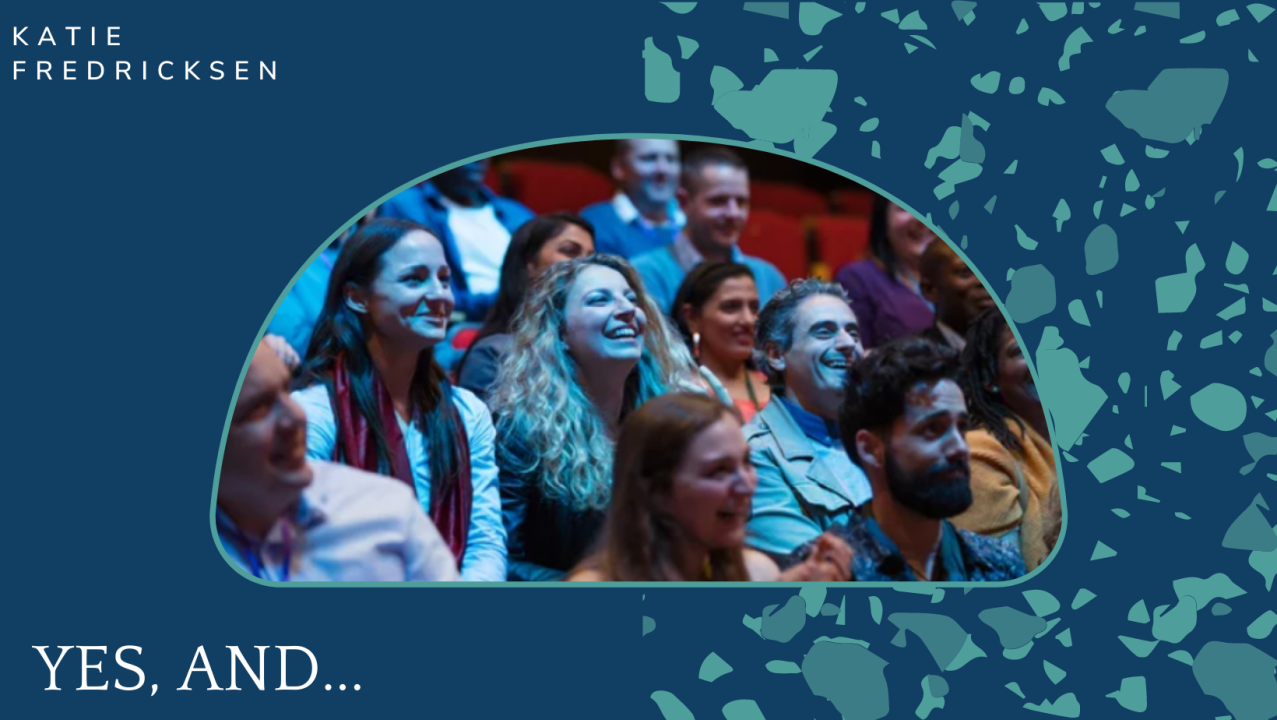
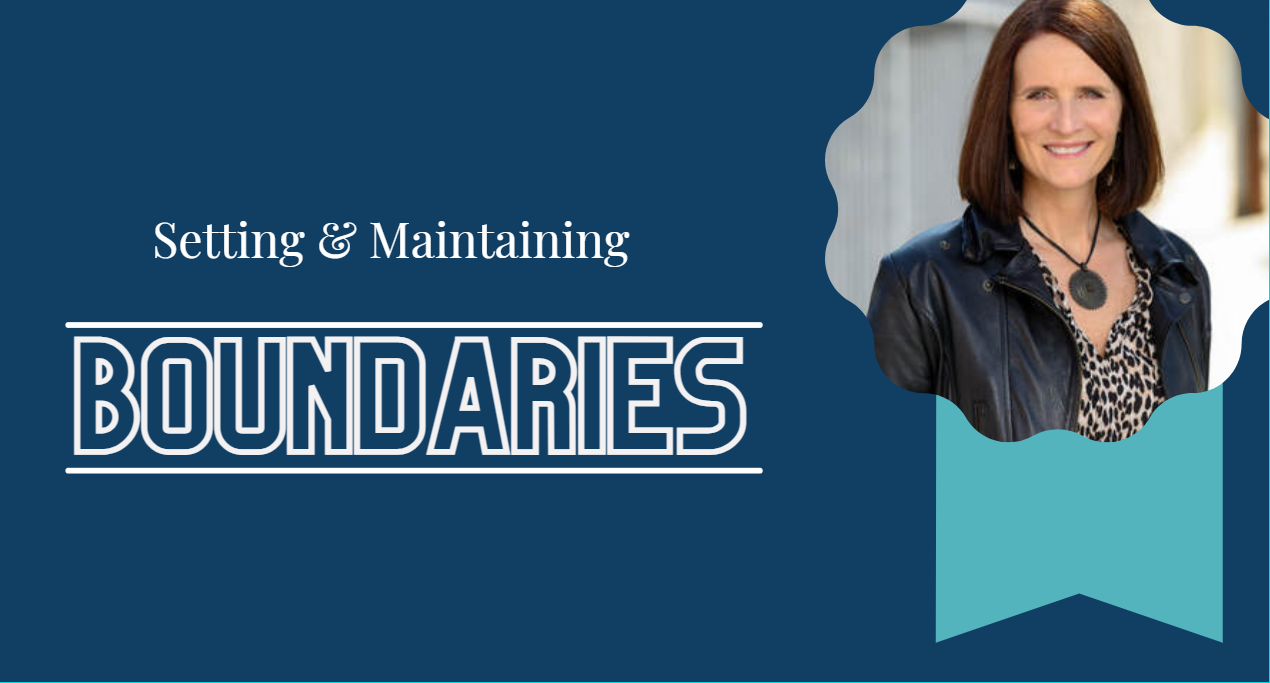


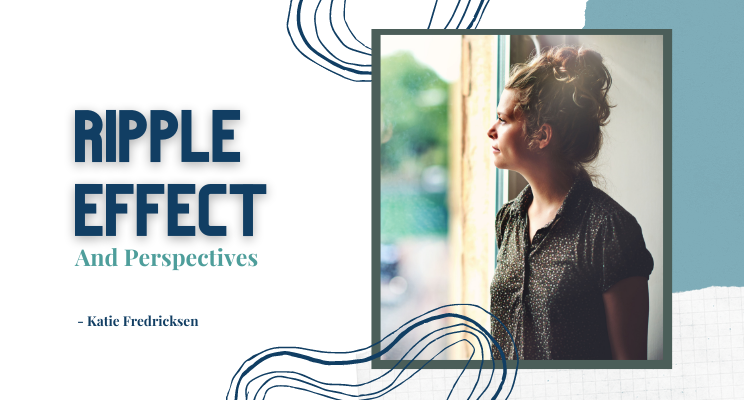
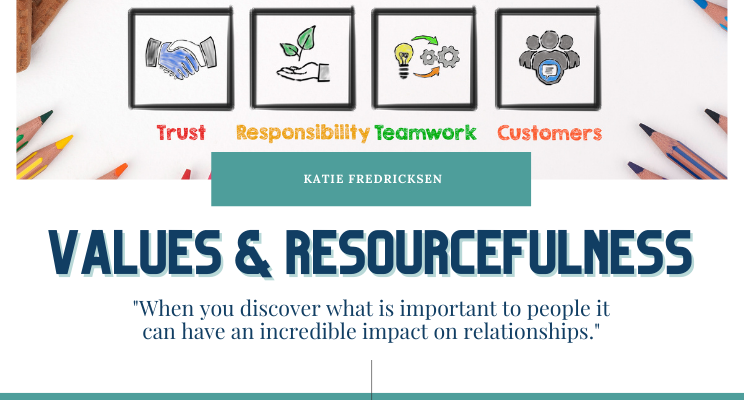
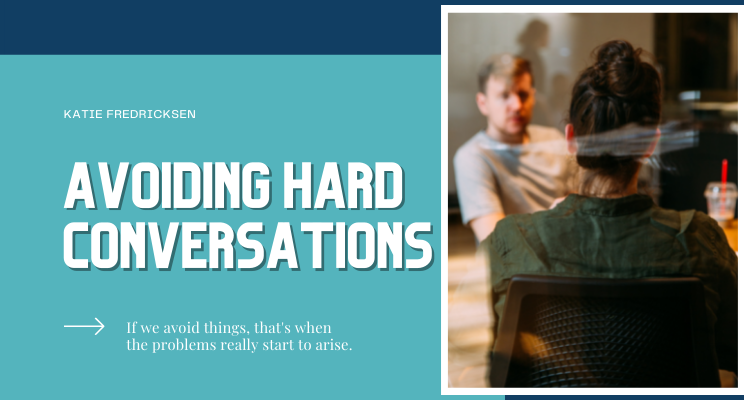
 RSS Feed
RSS Feed
